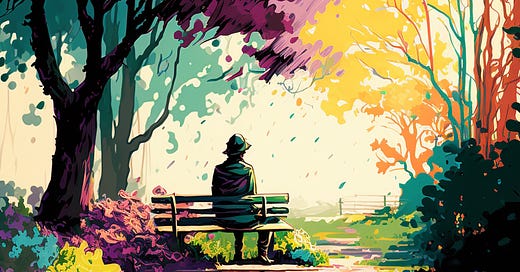How to Remain Human in the Age of AI
Even if we are not special after all, we may need to feel we are
On March 23, The Guardian's Simon Hattenstone had an interview with Jaron Lanier, famous for being the founder of the field of virtual reality and for his quirky appearance. The topic: Artificial intelligence.
Hattenstone entitled the article after one of Lanier’s many memorable statements: “The danger isn’t that AI destroys us. It’s that it drives us insane.” This story is about that insanity that’s slowly growing inside all of us, about the sources of its modern (AI-driven) strain, and about the secrets of the antidote that has been, all this time, dormant within each of us.
Lanier, well-known for his grounded criticism of the flaws of technology—and how humanity might misuse it—concluded the interview with a remark that left me wondering:
“A lot of modern enlightenment thinkers and technical people feel that there is something old-fashioned about believing that people are special—for instance that consciousness is a thing. They tend to think there is an equivalence between what a computer could be and what a human brain could be.”
I’ve noticed this mindset in my online circles (mostly AI people). Metaphors of the form “The brain is a computer,” “We all are stochastic parrots” or “It’s matrix multiplications all the way down” become literal on the basis of that belief: humans are not special. I see these equivalences, in Lanier’s wording, as reductionist attempts to redefine humanness into something that computers can reach.
Most—if not all—extreme techno-optimists, accelerationists, singularitarians, and pro-AI-at-any-cost wish and hope for a “technologified” world. An AI-driven post-scarcity society where the boundaries between human and machine are forever blurred. They don’t want us to be special because that would force them to remain humans—and just humans—forever.
They believe we’ll be better off as transhumanists (a fancier word for cyborg) and desire that future with a passion. They yearn to escape the unbearable lightness of their finite lives. If there’s nothing unique about being human, they’d say, then machines will inevitably match our intelligence and will, soon thereafter, improve us into superior beings—even if that entails saying goodbye to the last remnants of an existence of loving and being loved.
We need to feel we are special
There’s a huge mistake in that vision.
It isn’t that we aren’t special. They’re probably not wrong about that. We’ve been wrong many times in thinking the opposite—in putting ourselves at the center of everything—so they may as well be right this time.
Lanier has a stronger reason to reject this dehumanization of humanity which I believe is the most convincing argument I’ve read on this:
“We have to say consciousness is a real thing and there is a mystical interiority to people that’s different from other stuff because if we don’t say people are special, how can we make a society or make technologies that serve people?”
“What are we doing?” I thought.
Lanier’s insight reveals something deep about what it means to be human that goes well beyond what we actually are.




